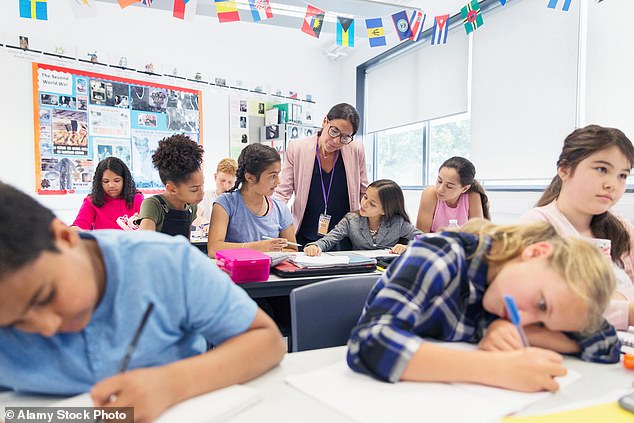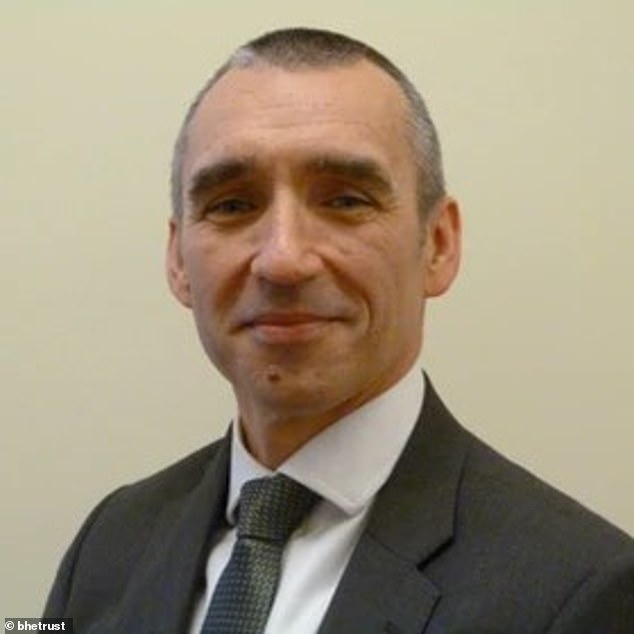
Primary school pupils as young as 10 are being asked about their parents’ drinking habits as well as their own in an ‘inappropriate’ survey.
The questionnaire was drawn up by health bosses at Norfolk County Council and has been distributed to primary schools across the county.
The 18-page survey includes a series of probing questions, asking how frequently they eat take-away meals and if gaming or television was affecting their sleep.
It also includes questions about smoking and alcohol habits in their households – and if they drink or smoke themselves.
Furious parents slammed the questionnaire as inappropriate for their children, especially as they weren’t consulted.
But the county council maintains the survey is ‘altered’ to be appropriate for different age groups.
Terry Myers, whose 10-year-old daughter attends Martham Academy in Norfolk




Primary school pupils as young as 10 are being asked about their parents’ drinking habits as well as their own in an ‘inappropriate’ survey. Stock image
Terry Myers, whose 10-year-old daughter attends Martham Academy in Great Yarmouth, Norfolk, said he and the other parents are ‘annoyed’.
He said: ‘A lot of the questions they asked just didn’t feel age-appropriate – quite a lot of parents are annoyed about it.
‘Ideally, I would want to read any questions being asked before my child was asked to fill it in, but that did not happen.’
The survey was aimed at children in years four, five and six, which means pupils as young as seven were asked to fill in answers.
Questions about smoking and drinking alcohol were only asked of older children in year six – aged 10 and 11 – but younger pupils were asked about the smoking and drinking habits of their parents and carers.
They were also asked questions about war and terrorism, their own mental health and wanted to know if there was any ‘shouting and violence’ in their homes.
The survey was part of a programme run by the county council called Flourish, an initiative aimed at improving the lives of children and young people in Norfolk.
It was produced with the aim of helping public health bosses understand how youngsters feel about certain areas of their lives.
Some schools and academies had to opt in to take part after being told what kind of questions would be asked and what the purpose of the research was.




Don Evans, chief executive of Broad Horizons Education Trust, which runs Martham Academy
Children taking part in the survey were told that they did not have to answer any questions if they felt uncomfortable but were worried how the ‘prefer not to say’ option would be interpreted.
A sample letter for parents ‘highlighted the ability of pupils to opt out’ should their parents not want them to take part.
Don Evans, chief executive of the Broad Horizons Education Trust, which runs Martham Academy, said parents had not been informed because of an ‘administrative error’.
He said: ‘Neither the school, nor the trust, had any involvement in the survey’s design – we were simply distributing it at school level on the council’s behalf.
‘In one case, there was an administrative error which meant parents and carers were not alerted to the survey in advance and that has understandably caused some angst.
‘When the headteacher realised her error she sent a full and frank apology to all parents and carers of children at the school.’
A spokeswoman for Norfolk County Council said: ‘The survey is a health and wellbeing survey designed specifically to cover key priority topics for children and young people in Norfolk.
‘These topics include physical health, emotional health, drug, alcohol and tobacco/vaping knowledge and use, oral health and safeguarding. The survey is altered for different age groups and covers the topics appropriate to that age group.’